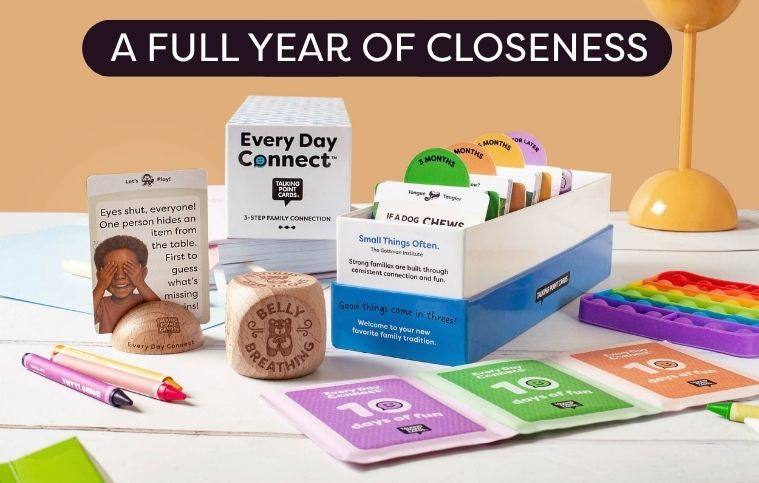SHOP
About
Lost the Spark?
How Honest Conversations Can Help Rekindle Your Relationship

Ever feel like you and your partner are just... existing together? Like two ships passing in the night, exchanging pleasantries about whose turn it is to do the dishes or what to watch on Netflix? Yeah, we've all been there. That magical spark that once lit up your world now feels more like a dim nightlight - functional, but not exactly exciting.
But here's the thing - relationships are kinda like houseplants. (Stay with me here!) You can't just put them on a shelf and expect them to thrive. They need attention, care, and most importantly, the right environment to grow. And just like how talking to plants supposedly helps them grow (jury's still out on that one), talking - really talking - with your partner can breathe new life into your relationship.
Why Do We Stop Talking? Like, Really Talking?
Remember when you first started dating? Those endless conversations that would stretch into the early hours of the morning, where you'd discuss everything from your childhood dreams to your weirdest fears? (Still convinced that ducks are plotting something...) What happened to those?
Life, that's what. We get comfortable. Busy. Tired. Before you know it, your conversations have devolved into:
-
"Did you pay the electric bill?"
-
"We need more milk."
-
"Can you pick up the kids from soccer practice?"
And let's be honest - sometimes it's just easier not to talk. Because talking - real, honest communication - can be scary. It means being vulnerable, risking conflict, and facing issues we'd rather sweep under the rug (along with those dust bunnies we've been ignoring).
The Cost of Conversational Constipation
When we stop having meaningful conversations, we:
-
Lose emotional intimacy
-
Start making assumptions about each other's thoughts and feelings
-
Miss opportunities for growth and connection
-
Become more like roommates than partners
It's like trying to drive a car without ever changing the oil - eventually, things are gonna start breaking down.

Getting Back to Good: The Art of Conversation Revival
1. Start Small (But Start!)
You don't have to dive straight into the deep end with "So, what are your thoughts on the meaning of life?" Start with baby steps:
-
Share a highlight from your day
-
Ask about a memory you shared ("Remember when we...?")
-
Talk about a goal or dream you haven't mentioned in a while
The key is to move beyond the transactional conversations about household logistics. Think of it as warming up your conversational muscles.
2. Create Space for Talking (Literally and Figuratively)
Ever notice how your best conversations often happen in specific settings? Maybe it's during long car rides, or when you're cooking together, or taking a walk. These "conversation-friendly" environments work because:
-
There's less pressure (you're focused on an activity)
-
There are fewer distractions
-
You're physically close but not necessarily face-to-face (which can make vulnerable conversations easier)
Try to recreate these conditions intentionally. And for the love of all things holy, put your phones away! Nothing kills a potentially meaningful conversation faster than the dreaded "phone scroll."
3. Ask Better Questions (And Actually Listen to the Answers)
Instead of the standard "How was your day?" try:
-
"What made you smile today?"
-
"Did anything surprise you today?"
-
"What's been on your mind lately?"
And when they answer, really listen. Not the kind of listening where you're just waiting for your turn to talk, but the kind where you're genuinely curious about what they're saying.

Pro tip: If you find yourself formulating your response while they're still talking, you're not really listening.
The Hard Stuff: Having Those Difficult Conversations
Okay, let's address the elephant in the room - sometimes the conversations we need to have are the ones we really, really don't want to have. Maybe it's about:
-
Money (always fun!)
-
Intimacy issues
-
Annoying habits
-
Family drama
-
The fact that they STILL can't seem to put their dirty socks in the hamper (seriously, it's right there)
How to Navigate the Tough Talks
-
Choose your timing wisely
-
Use "I" statementsInstead of: "You never listen to me!"Try: "I feel unheard when..."
-
Be curious, not furiousApproach the conversation with genuine curiosity about your partner's perspective. You might be surprised by what you learn.
-
Remember you're on the same teamIt's not You vs. Them, it's Both of You vs. The Problem
The Secret Sauce: Emotional Safety
Here's something they don't tell you in those cheesy relationship advice columns - the key to great communication isn't just about talking more, it's about creating an environment where both partners feel emotionally safe enough to be honest.
Signs of emotional safety in a relationship:
-
You can express disagreement without fear
-
Vulnerability is met with compassion
-
Mistakes are handled with grace
-
You feel accepted, not just tolerated
Building Emotional Safety
-
Practice non-judgmentYour partner tells you they've been thinking about quitting their job to become a professional unicyclist? Maybe not what you expected, but respond with curiosity rather than immediate criticism.
-
Validate feelings (even if you don't agree with the reasoning)"I can understand why you'd feel that way" goes a long way.
-
Keep confidencesWhat's said between you stays between you (unless they're planning a crime, in which case, maybe reconsider the relationship altogether).
The Payoff: What Happens When You Get Talking Again

When couples start having real conversations again, magical things happen:
-
You remember why you liked each other in the first place
-
Problems become easier to solve because you're actually talking about them
-
Intimacy improves (and not just the physical kind)
-
You start growing together instead of growing apart
One couple I know started having "question nights" where they'd take turns asking each other random questions from a jar. Sounds cheesy, right? But it led to them discovering new things about each other after 15 years of marriage. (Turns out he'd always secretly wanted to learn to juggle, and she had a childhood dream of writing a novel.)

When to Seek Help
Sometimes, despite our best efforts, we need a little outside perspective. There's no shame in seeking help from a relationship counselor or therapist. Think of it like calling a plumber when your pipes are blocked - sometimes you need an expert to help get things flowing again.
Signs it might be time for professional help:
-
You keep having the same arguments without resolution
-
One or both of you feel unheard despite trying to communicate
-
There's a breakthrough in communication that leads to more confusion
-
You're both willing to work on things but don't know where to start
The Bottom Line: Keep Talking
Relationships are living things that need nurturing to thrive. And while it might feel awkward or challenging at first to get back to really talking, the rewards are worth it. Because at the end of the day, we all want to be seen, heard, and understood by the person we've chosen to share our life with.
So tonight, instead of mindlessly watching another episode of whatever show you're binging, try turning to your partner and asking them something you've always wondered about. Who knows? You might just rediscover the spark that drew you together in the first place.
And if all else fails, you can always talk about how suspicious ducks are. Just saying.
LIKED THIS ARTICLE?
SIGN UP FOR MORE!






